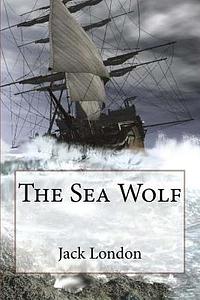You need to sign in or sign up before continuing.
Take a photo of a barcode or cover
Sailing ships, philosophical musings, seal hunting, capitalist critique, and fashion.
Not bad, but not the best of any of the novels that I've read by Jack London.
Not bad, but not the best of any of the novels that I've read by Jack London.
4.5 stars.
A mix of just about anything from Jules Verne and Conrad's "Heart of Darkness", maybe a little touch of "Blood Meridian" but on a ship in the ocean. Needless to say, this is the deep, gritty, exploratory adventure that was just right up my alley. I found it to be a supremely deep and interesting allegory accompanying just enough episodic adventure to appeal at every level. I think there's much more here than most people have the patience to wade through, but I had a blast with this while being moved and ideologically challenged at the same time. The writing is accessible but also very insightful and poetic. Just mastery from the author.
Regardless, no regrets about this one (but it's Jack London so I didn't really expect anything less).
A mix of just about anything from Jules Verne and Conrad's "Heart of Darkness", maybe a little touch of "Blood Meridian" but on a ship in the ocean. Needless to say, this is the deep, gritty, exploratory adventure that was just right up my alley. I found it to be a supremely deep and interesting allegory accompanying just enough episodic adventure to appeal at every level. I think there's much more here than most people have the patience to wade through, but I had a blast with this while being moved and ideologically challenged at the same time. The writing is accessible but also very insightful and poetic. Just mastery from the author.
Regardless, no regrets about this one (but it's Jack London so I didn't really expect anything less).
adventurous
challenging
dark
emotional
hopeful
informative
reflective
sad
tense
Plot or Character Driven:
A mix
Strong character development:
Yes
Loveable characters:
Yes
Diverse cast of characters:
No
Flaws of characters a main focus:
Yes
adventurous
dark
emotional
hopeful
medium-paced
Plot or Character Driven:
Plot
Strong character development:
Yes
Loveable characters:
Yes
Diverse cast of characters:
Yes
Flaws of characters a main focus:
Yes
adventurous
dark
reflective
tense
medium-paced
Plot or Character Driven:
A mix
Strong character development:
Yes
Loveable characters:
Complicated
Diverse cast of characters:
No
Flaws of characters a main focus:
Yes
If a reader were to complain that they adore the idea of 'Moby Dick' but cannot overcome the novel's baroque prose, obscure references, and other Melvillian typicalities, I will excitedly point them to Jack London's 'The Sea Wolf.' By no means is 'The Sea Wolf' superior to Moby Dick-far from it given the vigorous prose and pulpy melodrama, but it utterly succeeds at porytaying a pop-cultural idea of Moby Dick still enduring in the minds of laymen; an epic sea voyage, a diverse crew, a mad Captain who waxes poetic on the nature of existence etc. But unlike the Romantic, Emersonian plight of Ahab and his revolt against the slipperiness of the world, 'The Sea Wolf's' indominatable Wolf Larsen is a different beast.
While still Miltonian and Byronian like moody Ahab, Captain Wolf Larsen differs in his rugged materialism, his refusal to accept God, the beyond, or any transcendental 'Bosh' (as he proclaims) in a pure, Nietzschean fashion (one indicitivave of those early interpretations a half century before Walter Kauffman's sanitization). That rules out the Ahab simulacra, but might we then call Larsen a formiddable Judge Holden at sea? A Judge who hunts seals in place of scalps, indluging in their mutual fetish for Victorian social Darwinism, the sciences, and humanities? Not so, for if McCarthy's albino archon rules omnipotent as suzerain of the earth, London's Larsen remains ever trapped on the surface.
So what then do we make of Wolf Larsen? To answer this, consider the novel's achievements; how London's antagonist assumes the role of an archtypal 'force of nature' character, all while having his own sensitivies, interests, and desires. Wolf Larsen is a real, nordic superhuman, utterly stronger than everyone else and infatuated with life, only to fall prey to the very thing he adores in his untimely demise. The vital spirit he so denies is powerful, but perhaps too powerful for life, too much to inhabit a body-much like Tolkien's Feanor whose soul had killed his mother the day of his birth. Mother Nature is not kind to her children after all, even her best ones. If Larsen could defeat a shark in hand to hand combat, then so too could a mere brain tumour defeat the Wolf. So Captain Wolf Larsen is not Judge Holden who says he will never die (Larsen detests immortality!) nor can he be Ahab because of his ruthless, rugged materialism. Captain Wolf Larsen then remains among this pantheon of literary villains, standing true and individual as his philosophy permits.
Thus far I've showered London's book with praise, but where 'The Sea Wolf' suceeds in its maniacal villain, it utterly flops when it comes to pacing. As Ambrose Bierce wrote in his review, the romance plot is terrible. Not only is it invasive in a story abound with hyper masculinity, but the early 1900s sexism grows rather irritating and boring. Soap-opera dramas clutter the pages, incessent ramblings between our heros love of the delicate female trapped in a tacked-on survival chapter, one unashamedly ripped from Robinson Crusoe. While Robert E Howard's 'Conan' can bag damsels in distress because of the nature of his titular anti-hero, London's Humphrey 'Hump' van Weyden cannot. But it is not the exploits of our protagonist that make 'The Sea Wolf' both entertaining and philosophically interesting. It is his relationship with Wolf Larsen that makes this novel all the while.
While still Miltonian and Byronian like moody Ahab, Captain Wolf Larsen differs in his rugged materialism, his refusal to accept God, the beyond, or any transcendental 'Bosh' (as he proclaims) in a pure, Nietzschean fashion (one indicitivave of those early interpretations a half century before Walter Kauffman's sanitization). That rules out the Ahab simulacra, but might we then call Larsen a formiddable Judge Holden at sea? A Judge who hunts seals in place of scalps, indluging in their mutual fetish for Victorian social Darwinism, the sciences, and humanities? Not so, for if McCarthy's albino archon rules omnipotent as suzerain of the earth, London's Larsen remains ever trapped on the surface.
So what then do we make of Wolf Larsen? To answer this, consider the novel's achievements; how London's antagonist assumes the role of an archtypal 'force of nature' character, all while having his own sensitivies, interests, and desires. Wolf Larsen is a real, nordic superhuman, utterly stronger than everyone else and infatuated with life, only to fall prey to the very thing he adores in his untimely demise. The vital spirit he so denies is powerful, but perhaps too powerful for life, too much to inhabit a body-much like Tolkien's Feanor whose soul had killed his mother the day of his birth. Mother Nature is not kind to her children after all, even her best ones. If Larsen could defeat a shark in hand to hand combat, then so too could a mere brain tumour defeat the Wolf. So Captain Wolf Larsen is not Judge Holden who says he will never die (Larsen detests immortality!) nor can he be Ahab because of his ruthless, rugged materialism. Captain Wolf Larsen then remains among this pantheon of literary villains, standing true and individual as his philosophy permits.
Thus far I've showered London's book with praise, but where 'The Sea Wolf' suceeds in its maniacal villain, it utterly flops when it comes to pacing. As Ambrose Bierce wrote in his review, the romance plot is terrible. Not only is it invasive in a story abound with hyper masculinity, but the early 1900s sexism grows rather irritating and boring. Soap-opera dramas clutter the pages, incessent ramblings between our heros love of the delicate female trapped in a tacked-on survival chapter, one unashamedly ripped from Robinson Crusoe. While Robert E Howard's 'Conan' can bag damsels in distress because of the nature of his titular anti-hero, London's Humphrey 'Hump' van Weyden cannot. But it is not the exploits of our protagonist that make 'The Sea Wolf' both entertaining and philosophically interesting. It is his relationship with Wolf Larsen that makes this novel all the while.
adventurous
reflective
tense
medium-paced
Plot or Character Driven:
Character
Strong character development:
Yes
Loveable characters:
Yes
Diverse cast of characters:
No
Flaws of characters a main focus:
N/A
adventurous
challenging
dark
emotional
funny
reflective
tense
medium-paced
Strong character development:
Yes
Loveable characters:
Yes
Diverse cast of characters:
Complicated
Flaws of characters a main focus:
Complicated
vamo ser sinceros, a relação do Larsen com Hump beirava muito o homossexualismo, acho que até o autor percebeu e colocou aquela maldita Maud pra dar uma aliviada.
adventurous
dark
emotional
sad
tense
medium-paced
Plot or Character Driven:
Character
Strong character development:
Yes
Loveable characters:
Complicated
Diverse cast of characters:
Yes
Flaws of characters a main focus:
Complicated



